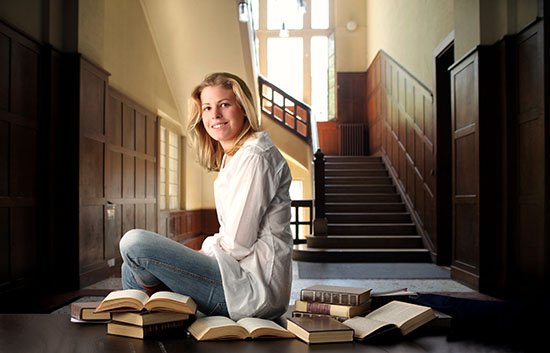A viable but expensive option for a child’s education that can offer more than a private or public school.
by Adrienne West

Living in NoVA provides parents with plenty of education options, including numerous boarding schools that offer an alternative to public or private school. The Madeira School in McLean caters to only girls, the Episcopal High School in Alexandria is coed, and the Randolph-Macon Academy in Front Royal offers military training to both boys and girls—just to name a few. But when considering this option, parents are faced with a number of questions: What does boarding school offer that other options lack? Should my child go to a coed or single-sex school? Will my child be OK away from home (and will I be OK with them being away)? How far is too far away from home? Is sending my child overseas an option? How much does it cost, and how will we pay for it?
We spoke with some experts who work in the industry and have sent their own children to boarding school, as well as a former student of boarding school to get answers to these questions and more. Kim Newsome is dean of students at Madeira, and her son attended a boarding school in New Jersey. Robert Knox Kennedy is a writer for the independent Boarding School Review, and his children attended boarding schools in Connecticut. Gaby Boateng, 24, of Great Falls, went to two boarding schools in Switzerland and one in France during her middle to early high school years.
Why should NoVA parents send their child to a boarding school instead of one of the many great private or public schools in the area?
Newsome: Boarding school offers such a unique, transformative experience for adolescents. It’s not something that can be found in a day environment because there is so much that happens for our girls after they get out of class. They learn to do a lot of things on their own. They need to be able to manage their workload and their deadlines, and we put structures in place to help them develop [those skills]. And they interact with a community of adults that broadens their relationships and prepares them for life after high school. It’s going to depend on your child’s personality. It’s not a fit for everyone, but keep an open mind about it and visit the campuses to really see how they feel to your child.
Kennedy: Tune out any prejudices you may have about any kind of school, and try as much as possible to compare apples to apples. Boarding schools that offer programs for students with special needs tend to do a good job simply because they offer plenty of individual instruction, [whereas] public schools facing budget cuts [have] to reduce faculty.
Boateng: I had a hard time my first year, really hard, but it forced me to take care of myself and come out of my shell. After that first year, I was really happy that I was there and thanked my parents for the opportunity. I wouldn’t be the person I am today if they hadn’t given me that chance. I’m lucky my parents were able to give me that extra boost. And now my sister is at boarding school overseas and has loved every minute of it.
What are some other benefits that boarding school will offer a child? What do students do in their downtime?
Newsome: We have a much smaller class size, which offers a more individual experience. We’re not forced to deal with the public school situation where there are over 30 kids per class. They really develop relationships with their teachers and the other girls. They are very involved in the school community, with many after-school and weekend activities often involving teachers and staff. Many of them play regional sports, and there are many clubs here.
Kennedy: Most boarding schools offer extensive athletic programs; the same thing is true of extracurricular activities. Boarding schools strive to educate the whole child. They integrate academics, sports and extracurricular activities into a comprehensive package.
What do you say to the people who have gotten negative feedback from family and friends about sending their child away?
Newsome: We didn’t send our child away—he chose it. It was a family decision; my son applied to day and boarding schools and chose boarding school. Of course I missed him, but it wasn’t about what was best for me. It was about what was best for him. He had the drive, and we knew that he would thrive in that environment. My other son has decided not to go to boarding school.
Kennedy: This is one of the reasons why we sent our daughters to boarding school: Boarding schools offer 24/7 supervision. We were busy parents with demanding careers. Our custodial worries vanished the minute the girls went off to boarding school. Students are in a safe, secure place in the company of dozens of new, like-minded friends. Boarding schools pride themselves on creating communities with close bonds; every member of that community counts. Boarding schools don’t have the kind of social stratification that seems to occur in public schools. There are no jocks, geeks, nerds and so on. Students attend boarding school to learn, so there is no stigma to being smart. Bullying in all its forms is very rare.
The cost can be daunting for some families to consider. What should they know about the financial costs of boarding school?
Newsome: Reach out to the admissions office and ask about financial aid options. Many parents just assume that they can’t afford it and stop there. But there are so many options. You have to remember it’s an investment in your child’s future.
Kennedy: American boarding schools range in cost from $20,000 to $65,000 for tuition, room and board. Then there are all the extras such as laundry, lessons, uniforms, athletic equipment, tuition insurance and other miscellaneous charges. Most schools bill you for those monthly. Just about every boarding school I can think of offers financial aid. Aid is based on need, not academic. The individual schools will make their own determination of how much to award based typically on the number of requests for financial aid and the size of the financial aid pool.




